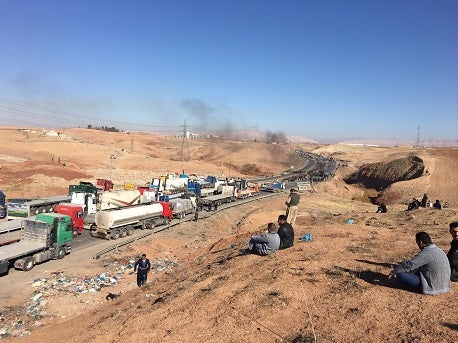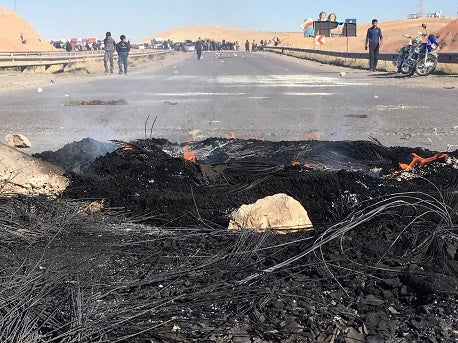CHAMCHAMAL, Kurdistan Region – People took to the main Sulaimani-Kirkuk roadway in the town of Chamchamal in Sulaimani Province on Saturday to protest a lack of services in the area.
Ramik Ramazan, the mayor of Chamchamal, told Rudaw that demonstrations kicked off Saturday morning without prior permission from local authorities.
“We are calling on the protesters to raise their demand in a civil way,” he said. “Whatever is needed we will do to protect them and stop any rioters trying to blend in with the protesters.”
He said they had sent their representatives to speak with the demonstrators in order to receive their calls and raise it to the relevant parties.
Ramazan decried the recent “political discourse” of the parties, without naming them, as the reason for fueling the protests.

Traffic comes to a standstill in Chamchamal on Saturday.
Photos and videos show the blockade of the Sulaimani-Kirkuk road, the town’s mayor dismissed these rumors saying traffic was normal.
The protesters are asking for essential services, notably electricity, as well as receiving continually-delayed salaries of civil servants.
The KRG has planned to reduce the salaries of high-earners by as much as 33 percent after a dramatic drop in revenue with the loss of Kirkuk’s oil fields to the Iraqi government.
The new pay cuts will affect those who were skipped during a previous round of salary reductions as part of largely unpopular austerity measures in 2016.
Since the October takeover, the Kurdistan Regional Government, which is heavily reliant on oil production, has seen its monthly revenues decreased from $565.5 million to $337.4 million, a 40 percent drop.
The decrease compounds economic challenges in the Kurdistan Region after continued budget cuts from Baghdad, a global drop in oil prices, a war against ISIS, and waves of IDPs and refugees.

The burned remains of tires on the highway in Chamchamal on Saturday.




Comments
Rudaw moderates all comments submitted on our website. We welcome comments which are relevant to the article and encourage further discussion about the issues that matter to you. We also welcome constructive criticism about Rudaw.
To be approved for publication, however, your comments must meet our community guidelines.
We will not tolerate the following: profanity, threats, personal attacks, vulgarity, abuse (such as sexism, racism, homophobia or xenophobia), or commercial or personal promotion.
Comments that do not meet our guidelines will be rejected. Comments are not edited – they are either approved or rejected.
Post a comment